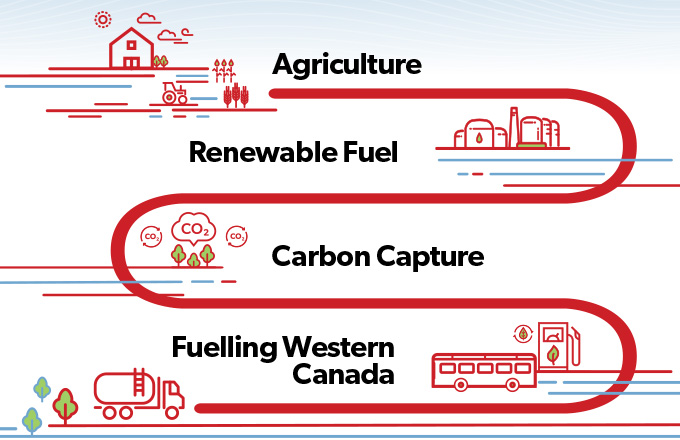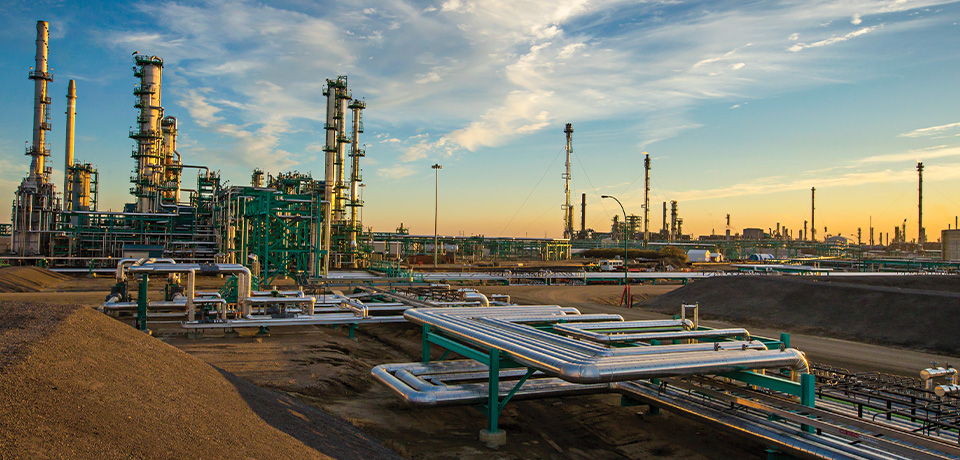Co-op has deep roots in Western Canada and for more than 86 years the Co-op Refinery Complex (CRC) has been producing the transportation fuels that power our economy. Today, the CRC is one of Canada’s largest integrated refining and upgrading complexes, processing up to 130,000 barrels a day of Western Canadian crude and employing nearly 1,000 people.
The transition to a low carbon economy is creating very real and meaningful changes that Co-op is embracing. From small communities to large urban centres, we are committed to fuelling Western Canada with clean, renewable transportation fuels for generations to come.
Today’s Commitment
A fundamental shift to low carbon fuel sources is taking place globally. Here, regulations in the form of carbon tax and Clean Fuel Standards are very quickly reshaping the entire industry.
This transition may be one of the largest shifts that Co-op will have to make in its long history, but we are committed to being leaders in producing the highest-quality fuel products while taking steps to lower our carbon footprint. Federated Co-operatives Limited (FCL) has committed to reducing greenhouse gas emissions by 40 per cent below 2015 levels by 2030 with aspirations of achieving net zero emissions by 2050. To achieve this, an Energy Roadmap has been developed that will guide Co-op’s journey in the years to come.
The Road Ahead
With a focus on energy efficiency and renewable fuels, Co-op’s Energy Roadmap is an exciting undertaking that requires innovative thinking, investment in strategic projects and an unwavering commitment to Western Canada.
Recognizing the essential role that plant-based fuels will play in the transition to a low carbon economy, Co-op acquired Terra Grain Fuels, now the Co-op Ethanol Complex (CEC), in 2019. This was a strategic investment that aligned with Co-op’s commitment to be a responsible and sustainable producer of high-quality fuel products.
Following that up, another integral step in the process was recently announced when a land purchase option was secured for a potential renewable diesel plant in the Regina area.
“We have an important role to play in helping Western Canadians transition to sustainable fuel choices. Many of our members want us to be leaders in this space, and we realize with the close working relationship Co-ops have with many farmers across the Prairies, we have a unique opportunity to help them unlock a new part of the agricultural value chain,” said Patrick Bergermann, FCL Associate Vice President – Energy Roadmap. “Our investment in the CEC and renewable diesel, along with our network of Co-op Agro Centres, gives us the opportunity to have conversations with the very farmers who produce the products that are going to be processed and put back into people’s fuel tanks.”
Carbon capture and sequestration is another key area of focus. To help achieve our emission reduction targets, a memorandum of understanding has been signed with Whitecap Resources. Through the planned operating agreement, carbon dioxide emissions — to the tune of 500,000 tonnes annually — captured from the CRC and CEC, would be transported to, stored in, and used as part of the Whitecap-operated Weyburn Unit, which is the single largest anthropogenic carbon sequestration project in the world.
“We have an obligation to the entire Co-operative Retailing System and to Western Canadians to build sustainable communities together, and to be a responsible and thoughtful neighbour,” said Pam Skotnitsky, FCL Vice President – Strategy. “We are committed to transforming our energy business. In the true Co-op way, it is about building for the future and contributing to the strength and sustainability of our communities.”
These efforts will position Western Canadian communities for a better, more sustainable tomorrow.







